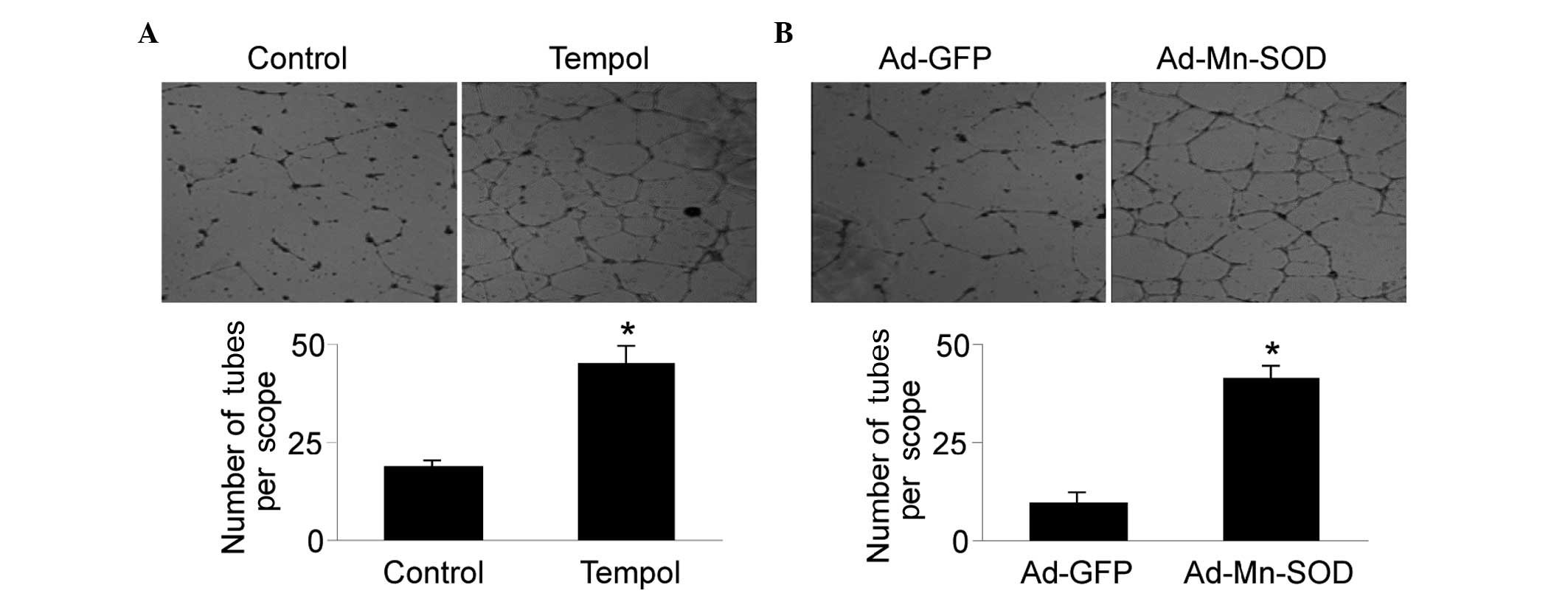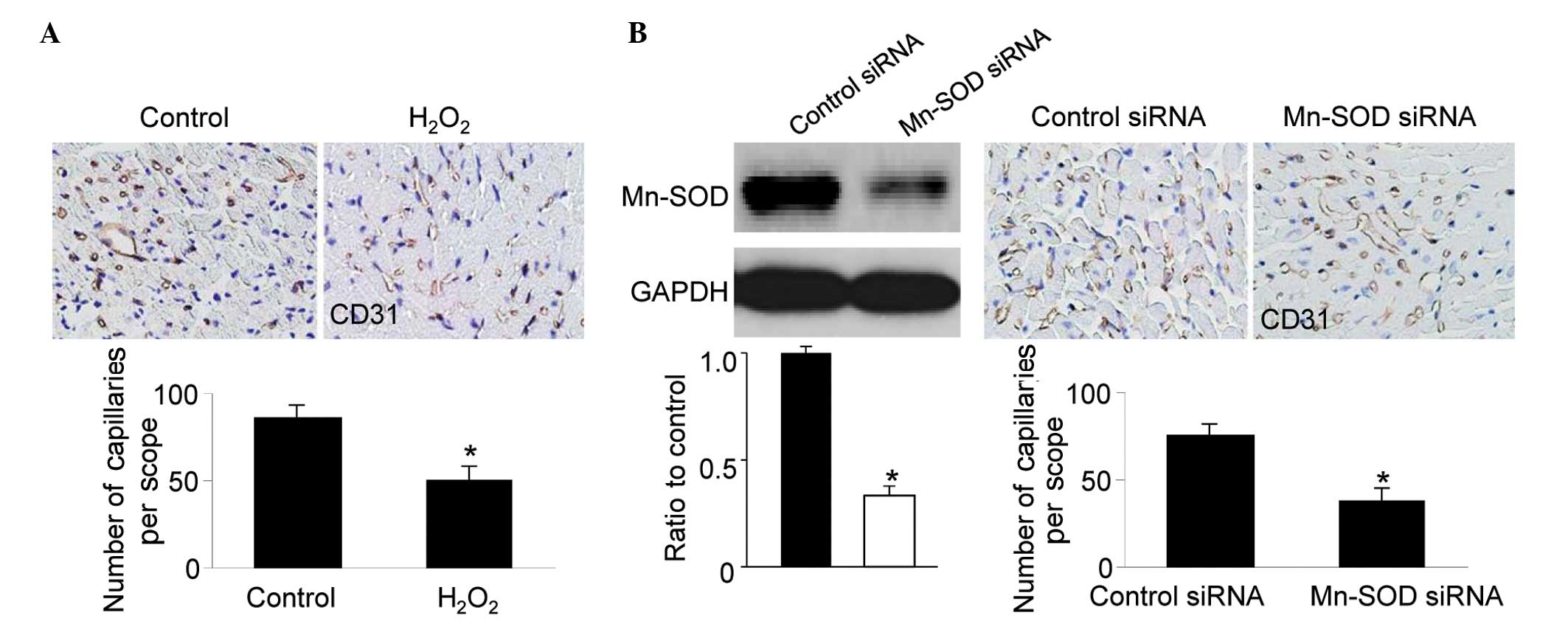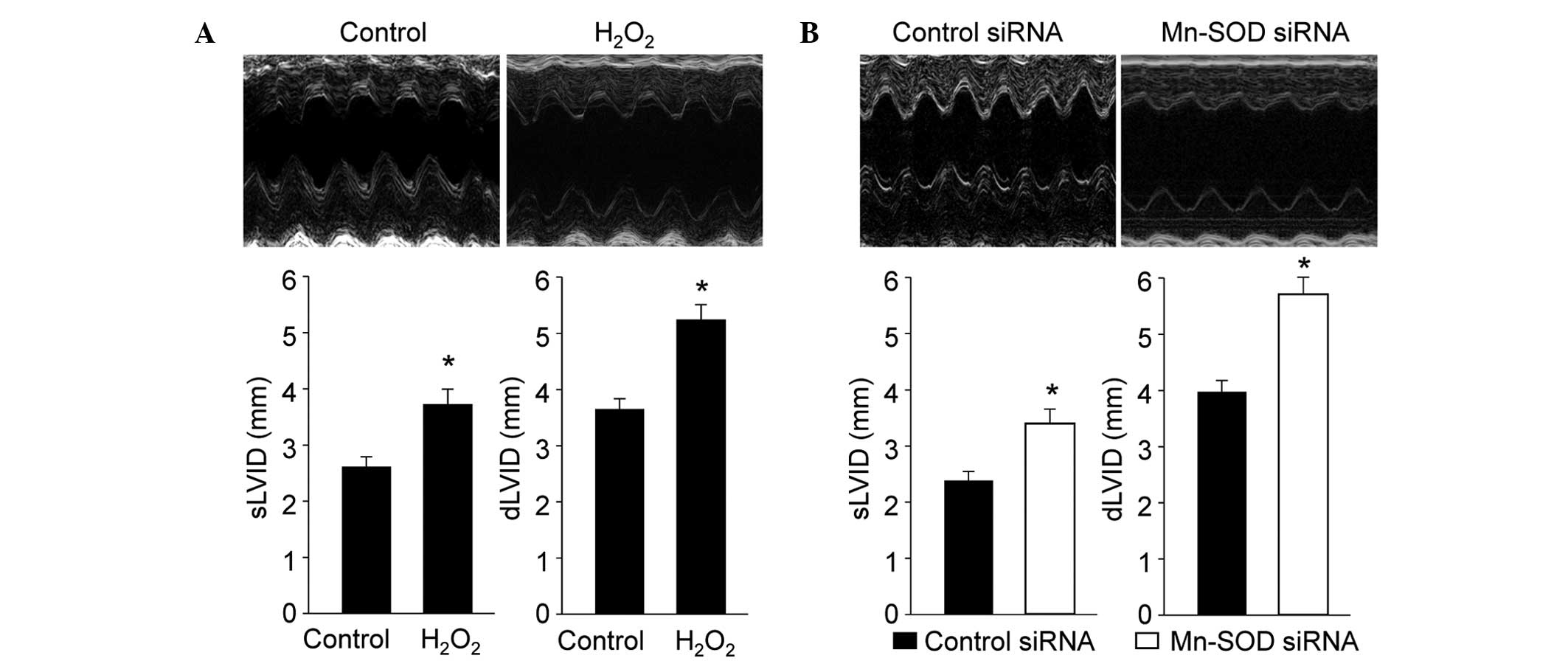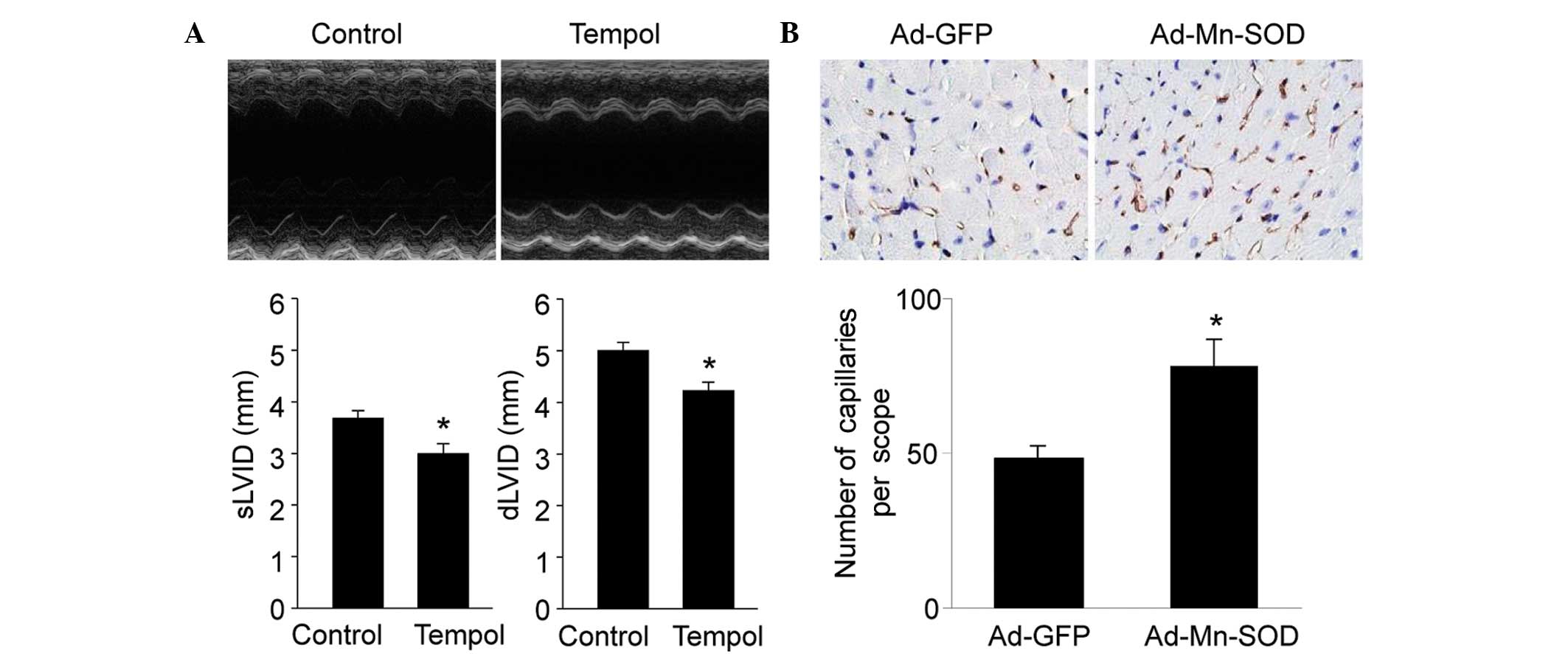|
1
|
Brownlee M: Biochemistry and molecular
cell biology of diabetic complications. Nature. 414:813–820. 2001.
View Article : Google Scholar : PubMed/NCBI
|
|
2
|
Rolo AP and Palmeira CM: Diabetes and
mitochondrial function: Role of hyperglycemia and oxidative stress.
Toxicol Appl Pharmacol. 212:167–178. 2006. View Article : Google Scholar : PubMed/NCBI
|
|
3
|
Luo JD, Wang YY, Fu WL, Wu J and Chen AF:
Gene therapy of endothelial nitric oxide synthase and manganese
superoxide dismutase restores delayed wound healing in type 1
diabetic mice. Circulation. 110:2484–2493. 2004. View Article : Google Scholar : PubMed/NCBI
|
|
4
|
Wang S, Xu J, Song P, Viollet B and Zou
MH: In vivo activation of AMP-activated protein kinase attenuates
diabetes-enhanced degradation of GTP cyclohydrolase I. Diabetes.
58:1893–1901. 2009. View Article : Google Scholar : PubMed/NCBI
|
|
5
|
Zhang M, Brewer AC, Schröder K, Santos CX,
Grieve DJ, Wang M, Anilkumar N, Yu B, Dong X, Walker SJ, et al:
NADPH oxidase-4 mediates protection against chronic load-induced
stress in mouse hearts by enhancing angiogenesis. Proc Natl Acad
Sci USA. 107:18121–18126. 2010. View Article : Google Scholar : PubMed/NCBI
|
|
6
|
Zeng H, He X, Hou X, Li L and Chen JX:
Apelin gene therapy increases myocardial vascular density and
ameliorates diabetic cardiomyopathy via upregulation of Sirtuin 3.
Am J Physiol Heart Circ Physiol. 306:H585–H597. 2014. View Article : Google Scholar : PubMed/NCBI
|
|
7
|
Cheng Y, Jiang S, Hu R and Lv L: Potential
mechanism for endothelial progenitor cell therapy in acute
myocardial infarction: Activation of VEGF-PI3K/Akte-NOS pathway.
Ann Clin Lab Sci. 43:395–401. 2013.PubMed/NCBI
|
|
8
|
Loomans CJ, de Koning EJ, Staal FJ,
Rookmaaker MB, Verseyden C, de Boer HC, Verhaar MC, Braam B,
Rabelink TJ and van Zonneveld AJ: Endothelial progenitor cell
dysfunction: A novel concept in the pathogenesis of vascular
complications of type 1 diabetes. Diabetes. 53:195–199. 2004.
View Article : Google Scholar : PubMed/NCBI
|
|
9
|
Kuliszewski MA, Ward MR, Kowalewski JW,
Smith AH, Stewart DJ, Kutryk MJ and Leong-Poi H: A direct
comparison of endothelial progenitor cell dysfunction in rat
metabolic syndrome and diabetes. Atherosclerosis. 226:58–66. 2013.
View Article : Google Scholar : PubMed/NCBI
|
|
10
|
van Ark J, Moser J, Lexis CP, Bekkema F,
Pop I, van der Horst IC, Zeebregts CJ, van Goor H, Wolffenbuttel BH
and Hillebrands JL: Type 2 diabetes mellitus is associated with an
imbalance in circulating endothelial and smooth muscle progenitor
cell numbers. Diabetologia. 55:2501–2512. 2012. View Article : Google Scholar : PubMed/NCBI
|
|
11
|
Saito H, Yamamoto Y and Yamamoto H:
Diabetes alters subsets of endothelial progenitor cells that reside
in blood, bone marrow, and spleen. Am J Physiol Cell Physiol.
302:C892–C901. 2012. View Article : Google Scholar : PubMed/NCBI
|
|
12
|
Balestrieri ML, Rienzo M, Felice F,
Rossiello R, Grimaldi V, Milone L, Casamassimi A, Servillo L,
Farzati B, Giovane A and Napoli C: High glucose downregulates
endothelial progenitor cell number via SIRT1. Biochim Biophys Acta.
1784:936–945. 2008. View Article : Google Scholar : PubMed/NCBI
|
|
13
|
Kränkel N, Adams V, Linke A, Gielen S,
Erbs S, Lenk K, Schuler G and Hambrecht R: Hyperglycemia reduces
survival and impairs function of circulating blood-derived
progenitor cells. Arterioscler Thromb Vasc Biol. 25:698–703. 2005.
View Article : Google Scholar : PubMed/NCBI
|
|
14
|
He T, Peterson TE, Holmuhamedov EL, Terzic
A, Caplice NM, Oberley LW and Katusic ZS: Human endothelial
progenitor cells tolerate oxidative stress due to intrinsically
high expression of manganese superoxide dismutase. Arterioscler
Thromb Vasc Biol. 24:2021–2027. 2004. View Article : Google Scholar : PubMed/NCBI
|
|
15
|
Chen DD and Chen AF: CuZn superoxide
dismutase deficiency: Culprit of accelerated vascular aging
process. Hypertension. 48:1026–1028. 2006. View Article : Google Scholar : PubMed/NCBI
|
|
16
|
Marrotte EJ, Chen DD, Hakim JS and Chen
AF: Manganese superoxide dismutase expression in endothelial
progenitor cells accelerates wound healing in diabetic mice. J Clin
Invest. 120:4207–4219. 2010. View
Article : Google Scholar : PubMed/NCBI
|
|
17
|
Krishnamurthy P, Thal M, Verma S, Hoxha E,
Lambers E, Ramirez V, Qin G, Losordo D and Kishore R:
Interleukin-10 deficiency impairs bone marrow-derived endothelial
progenitor cell survival and function in ischemic myocardium. Circ
Res. 109:1280–1289. 2011. View Article : Google Scholar : PubMed/NCBI
|
|
18
|
Feng Y, van Eck M, Van Craeyveld E, Jacobs
F, Carlier V, Van Linthout S, Erdel M, Tjwa M and De Geest B:
Critical role of scavenger receptor-BI-expressing bone
marrow-derived endothelial progenitor cells in the attenuation of
allograft vasculopathy after human apo A-I transfer. Blood.
113:755–764. 2009. View Article : Google Scholar : PubMed/NCBI
|
|
19
|
Yang XH, Li P, Yin YL, Tu JH, Dai W, Liu
LY and Wang SX: Rosiglitazone via γ-dependent suppression of
oxidative stress attenuates endothelial dysfunction in rats fed
homocysteine thiolactone. J Cell Mol Med. 19:826–835. 2015.
View Article : Google Scholar : PubMed/NCBI
|
|
20
|
Wang F-S, Chuang PC, Lin C-L, Chen M-W, Ke
H-J, Chang Y-H, Chen Y-S, Wu S-L and Ko J-Y: MicroRNA-29a protects
against glucocorticoid-induced bone loss and fragility in rats by
orchestrating bone acquisition and resorption. Arthritis Rheum.
65:1530–1540. 2013. View Article : Google Scholar : PubMed/NCBI
|
|
21
|
Wang J, Guo T, Peng QS, Yue SW and Wang
SX: Berberine via suppression of transient receptor potential
vanilloid 4 channel improves vascular stiffness in mice. J Cell Mol
Med. 19:2607–2616. 2015. View Article : Google Scholar : PubMed/NCBI
|
|
22
|
Wang S, Zhang C, Zhang M, Liang B, Zhu H,
Lee J, Viollet B, Xia L, Zhang Y and Zou MH: Activation of
AMP-activated protein kinase α2 by nicotine instigates formation of
abdominal aortic aneurysms in mice in vivo. Nat Med. 18:902–910.
2012. View
Article : Google Scholar : PubMed/NCBI
|
|
23
|
Nakamura M, Mie M, Mihara H, Nakamura M
and Kobatake E: Construction of multi-functional extracellular
matrix proteins that promote tube formation of endothelial cells.
Biomaterials. 29:2977–2986. 2008. View Article : Google Scholar : PubMed/NCBI
|
|
24
|
Bai WW, Xing YF, Wang B, Lu XT, Wang YB,
Sun YY, Liu XQ, Guo T and Zhao YX: Tongxinluo improves cardiac
function and ameliorates ventricular remodeling in mice model of
myocardial infarction through enhancing angiogenesis. Evid Based
Complement Alternat Med. 2013:8132472013. View Article : Google Scholar : PubMed/NCBI
|
|
25
|
Salter AB, Meadows SK, Muramoto GG,
Himburg H, Doan P, Daher P, Russell L, Chen B, Chao NJ and Chute
JP: Endothelial progenitor cell infusion induces hematopoietic stem
cell reconstitution in vivo. Blood. 113:2104–2107. 2009. View Article : Google Scholar : PubMed/NCBI
|
|
26
|
Yang J, Liu X, Jiang G, Chen Y, Zhang Y
and Zhang M: Two-dimensional strain technique to detect the
function of coronary collateral circulation. Coron Artery Dis.
23:188–194. 2012. View Article : Google Scholar : PubMed/NCBI
|
|
27
|
Zhao M, Wang XX and Wan WH: Effects of the
ginkgo biloba extract on the superoxide dismutase activity and
apoptosis of endothelial progenitor cells from diabetic peripheral
blood. Genet Mol Res. 13:220–227. 2014. View Article : Google Scholar : PubMed/NCBI
|
|
28
|
Xu MJ, Song P, Shirwany N, Liang B, Xing
J, Viollet B, Wang X, Zhu Y and Zou MH: Impaired expression of
uncoupling protein 2 causes defective postischemic angiogenesis in
mice deficient in AMP-activated protein kinase α subunits.
Arterioscler Thromb Vasc Biol. 31:1757–1765. 2011. View Article : Google Scholar : PubMed/NCBI
|
|
29
|
Tao L, Wang Y, Gao E, Zhang H, Yuan Y, Lau
WB, Chan L, Koch WJ and Ma XL: Adiponectin: An indispensable
molecule in rosiglitazone cardioprotection following myocardial
infarction. Circ Res. 106:409–417. 2010. View Article : Google Scholar : PubMed/NCBI
|
|
30
|
Ding L, Dong L, Chen X, Zhang L, Xu X,
Ferro A and Xu B: Increased expression of integrin-linked kinase
attenuates left ventricular remodeling and improves cardiac
function after myocardial infarction. Circulation. 120:764–773.
2009. View Article : Google Scholar : PubMed/NCBI
|
|
31
|
Meloni M, Caporali A, Graiani G, Lagrasta
C, Katare R, Van Linthout S, Spillmann F, Campesi I, Madeddu P,
Quaini F and Emanueli C: Nerve growth factor promotes cardiac
repair following myocardial infarction. Circ Res. 106:1275–1284.
2010. View Article : Google Scholar : PubMed/NCBI
|
|
32
|
Adluri RS, Thirunavukkarasu M, Zhan L,
Akita Y, Samuel SM, Otani H, Ho YS, Maulik G and Maulik N:
Thioredoxin 1 enhances neovascularization and reduces ventricular
remodeling during chronic myocardial infarction: A study using
thioredoxin 1 transgenic mice. J Mol Cell Cardiol. 50:239–247.
2011. View Article : Google Scholar : PubMed/NCBI
|
|
33
|
Raval Z and Losordo DW: Cell therapy of
peripheral arterial disease: From experimental findings to clinical
trials. Circ Res. 112:1288–1302. 2013. View Article : Google Scholar : PubMed/NCBI
|
|
34
|
Liao YF, Feng Y, Chen LL, Zeng TS, Yu F
and Hu LJ: Coronary heart disease risk equivalence in diabetes and
arterial diseases characterized by endothelial function and
endothelial progenitor cell. J Diabetes Complications. 28:214–218.
2014. View Article : Google Scholar : PubMed/NCBI
|
|
35
|
Bae ON, Wang JM, Baek SH, Wang Q, Yuan H
and Chen AF: Oxidative stress-mediated thrombospondin-2
upregulation impairs bone marrow-derived angiogenic cell function
in diabetes mellitus. Arterioscler Thromb Vasc Biol. 33:1920–1927.
2013. View Article : Google Scholar : PubMed/NCBI
|
|
36
|
Kupatt C, Hinkel R, Pfosser A, El-Aouni C,
Wuchrer A, Fritz A, Globisch F, Thormann M, Horstkotte J, Lebherz
C, et al: Cotransfection of vascular endothelial growth factor-A
and platelet-derived growth factor-B via recombinant
adeno-associated virus resolves chronic ischemic malperfusion role
of vessel maturation. J Am Coll Cardiol. 56:414–422. 2010.
View Article : Google Scholar : PubMed/NCBI
|
|
37
|
Samuel SM, Akita Y, Paul D,
Thirunavukkarasu M, Zhan L, Sudhakaran PR, Li C and Maulik N:
Coadministration of adenoviral vascular endothelial growth factor
and angiopoietin-1 enhances vascularization and reduces ventricular
remodeling in the infarcted myocardium of type 1 diabetic rats.
Diabetes. 59:51–60. 2010. View Article : Google Scholar : PubMed/NCBI
|
|
38
|
Haider H, Akbar SA and Ashraf M:
Angiomyogenesis for myocardial repair. Antioxid Redox Signal.
11:1929–1944. 2009. View Article : Google Scholar : PubMed/NCBI
|
|
39
|
Llevadot J and Asahara T: Effects of
statins on angiogenesis and vasculogenesis. Rev Esp Cardiol.
55:838–844. 2002.(In Spanish). View Article : Google Scholar : PubMed/NCBI
|
|
40
|
Arnaoutova I, George J, Kleinman HK and
Benton G: The endothelial cell tube formation assay on basement
membrane turns 20: State of the science and the art. Angiogenesis.
12:267–274. 2009. View Article : Google Scholar : PubMed/NCBI
|




















